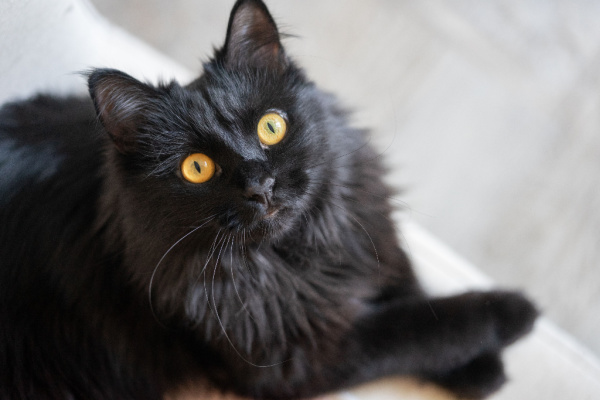National Black Cat Day, celebrated annually on October 27, was established to combat the superstitions and misconceptions that have surrounded black cats for centuries. It emphasizes the importance of celebrating and supporting these often overlooked and misunderstood feline companions.
This day plays a vital role in advocating for the welfare and adoption of black cats, ensuring they find loving homes and receive the care they deserve.
But how did black cats get such a bad rap? Somewhere down the line, black cats became both a Halloween-favorite and a symbol of bad luck. Many people still believe that a black cat crossing your path is an omen of misfortune and even death! But how exactly did these cute kitties get stuck with this black cat superstition?
According to ETHOS Veterinary Health, one theory claims that black cats’ bad rap began in Greek mythology. When Hera (Zeus’ wife) transformed her servant Galinthias into a black cat out of anger, Galinthias then went on to serve the goddess of magic and spells, Hecate. And there you have it – the black cat became the witch’s sidekick!
Fast-forward thousands of years to the Middle Ages in Europe, and black cats still couldn’t catch a break. A folklore spread about a man and his son who came across a black cat, which they began to toss rocks at. The injured cat ran into a woman’s house who was suspected of being a witch. When the woman happened to appear limping and bruised the next day, people suspected that the cat must be the woman in disguise. Hmm….
Other theories suggest that during this time, people started to see black cats as a sign of death and bad luck simply because of their black fur, just like ravens and crows. Sadly, mass killings of black cats spread across Europe as people tried to rid the streets of these bad omens, especially during the Great Plague.
This disturbing practice carried over into the prosecution of witches across Europe and eventually to the Salem Witch Trials. Black cats whose owners were accused of witchcraft were associated with the Devil and evil. People thought black cats assisted witches in their evil deeds. They also believed that witches could transform into black cats to lurk in the shadows and cast spells on people. Both witches and black cats were persecuted and killed together.
That being said, there were plenty of black cat-lovers throughout history, too! Ancient Egyptians viewed black cats as divine and believed that gods lived within them. In certain parts of 19th century Europe, black cat sightings were actually considered good omens. The Irish believed that a black cat on your porch was good luck, and in Japan black cats are similarly revered as symbols of prosperity.
Luckily for our feline friends, these bad superstitions have virtually vanished. Black cats are now a part of many families across the world! However, many black cats are still mistreated and feared today, especially around Halloween. This is why we always caution owners of black cats to keep them safely indoors around that time of year.
Participating in National Black Cat Day allows you to show your love for these beautiful creatures and support their adoption. Here are some meaningful ways to get involved:
- Adopt a Black Cat: Consider adopting a black cat from a local animal shelter or rescue organization, providing them with a loving home.
- Spread Awareness: Share information about the benefits of black cat adoption and dispel common myths about them.
- Support Local Shelters: Donate supplies, volunteer your time, or contribute to local animal shelters and rescue groups that care for black cats.
- Share Black Cat Stories: Share heartwarming stories and photos of black cats on social media to inspire others to adopt them.
- Host Adoption Events: Organize or attend adoption events and fairs that focus on finding homes for black cats.
- Advocate for Responsible Ownership: Promote responsible pet ownership by encouraging spaying/neutering and regular veterinary care for black cats.
—
Photo Credit: Shveyn Irina / Shutterstock.com
